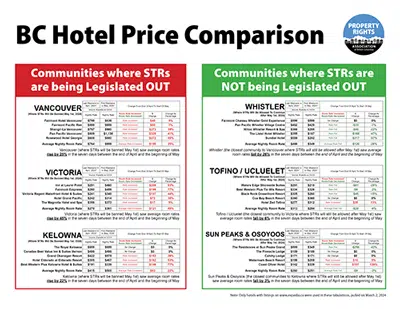Loss Of Short Term Rental Units May Have Serious Impact On BC Tourism
Hotel Room Prices Surge In Communities Where Short Term Rental Accommodations Are Being Legislated Out
March 6, 2024
By Jeff Sutherland
There have been many questions raised about the upcoming ban on short term rentals (STR’s).
Now you can also add in unforeseen consequences… in particular, the effects on tourism.
Less total rooms likely means less total tourists but equally concerning should be the rise in hotel room rates when supply decreases.
In communities across the province where short term rentals are set to disappear, hotel room rates after May 1st are showing startling increases (see attached PDF).
It might be argued that these increases simply indicate the start of the summer tourist season but a comparison with other communities where STR’s will be allowed to continue tells a different story.
Using the expedia.ca website on March 2nd of this year, a comparison of the cost for a weekend stay just before and after the ban date showed prices shooting up by double digits in communities where STRs will be removed from the available accommodation inventory.
On the other hand, in every case of a community where STR’s will remain, prices actually fell.
In Victoria for example, room rates for a two night stay over the last weekend in April averaged $270. A week later – after the STRs are gone – the same two-night stay averaged $391… a staggering 45% price increase in just seven days.
This is in sharp contrast to the nearest Vancouver Island community where STR’s will continue to be allowed, Tofino/Ucluelet. Prices there actually show a decline of 6%.
Even more significant is the comparison between Vancouver where STR’s will be gone and Whistler where they will remain. In this case, room rates in Vancouver go up by an average of 25% while Whistler’s decline by 26%.
Kelowna, the final major centre to see the ban has rates rising by 22%.
While less overall available rooms means less potential tourists and rate hikes mean less tourists overall, STRs actually also tend to serve a different niche.
Most are apartments with kitchens and separate bedrooms suitable for small groups and families who may be on a budget, options that most hotels simply cannot offer.
Unless four people are willing to share a single hotel room or pay double the now inflated prices for two rooms, they are going to be vacationing somewhere else or not vacationing at all.
This ban on short term rentals is a result of controversial legislation tabled by the provincial government last fall. Bill 35 was intended to increase the inventory of long-term rental units by making short term rentals illegal in many larger communities. While the objective of getting rid of illegal short term rentals is applauded, the legal short term rentals, a much smaller number are getting caught in the cross-fire.
In the case of Victoria, the removal of 634 legal units from the STR rental supply would only increase the long-term inventory by just over 1%. However those units would not be affordable housing, being in the most expensive locations for real estate in Victoria.
Now, the validity of the study that underpinned the government’s decision is also in dispute, with documented data inaccuracies. To further call into question its fairness as a source for legislation, the study condemning short term rentals was funded by the BC Hotel Association bringing into question its impartiality.
This article was written by Jeff Sutherland, a member of grassroots organization propertyrightsbc.org and an STR owner. To find out more about propertyrightsbc.org who represent the province’s short term rental owners, please contact info@propertyrightsbc.org .


